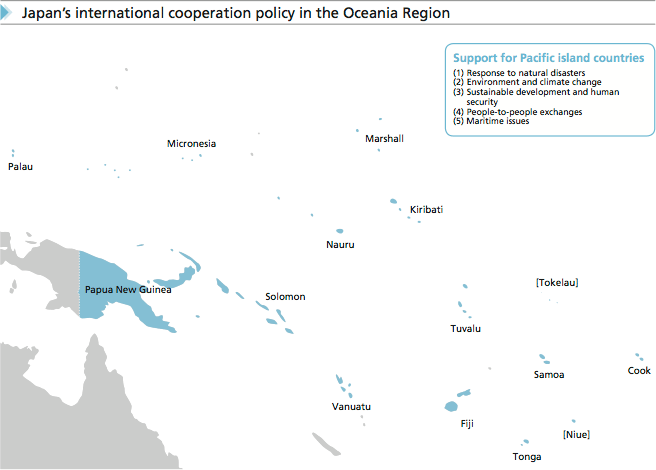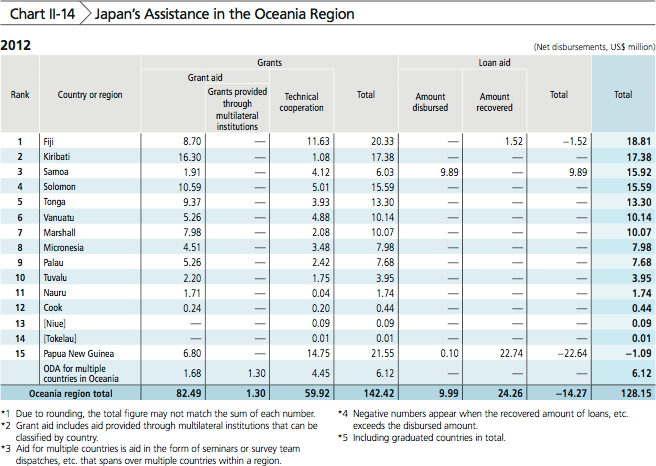Japan's Official Development Assistance White Paper 2013
7. Oceania
The Pacific island countries are not only Japan’s “neighbors” that share the Pacific Ocean, but also have historical ties to Japan. Having an enormous Exclusive Economic Zone (EEZ), these countries and regions are the cornerstone of Japan’s maritime transport, and they provide important deep-sea fishing grounds for us. Thus the peace and prosperity of the Pacific island countries are extremely important to Japan.
Meanwhile, many of the Pacific island countries are newly independent states, and it is urgently necessary for them to establish economically self-reliant nations. In addition, there are common problems such as small-sized economies depending on primary industries, broadly stretched territories, difficult access to the international market, vulnerability to natural disasters, and the risk of land loss because of sea-level rise. Moreover, Fiji has been promoting efforts towards democratization. Based on such circumstances, Japan provides assistance taking into consideration the situation in each country and region, as a good partner to the Pacific island countries.
<Japan’s Efforts>
To achieve political stability and self-reliant economic development in the Pacific island countries, it is crucial to overcome socio-economic vulnerabilities and to provide cooperation for the entire region. In addition to promoting cooperation with the Pacific Islands Forum (PIF) (Note 6) a framework for regional cooperation composed of the Pacific island countries, Japan holds the Pacific Islands Leaders Meeting (PALM), the summit meeting between Japan and Pacific island countries, held once in every three years since 1997.
The Sixth Pacific Islands Leaders Meeting (PALM6) was held in Nago City, Okinawa in May 2012, under the catchphrase ‘We are Islanders - For Growing ‘Kizuna’ in the Pacific.’ At PALM6, Japan committed to making maximum efforts to provide the assistance of up to $500 million over the next three years in order to promote cooperation in the following five pillars: (i) response to natural disasters, (ii) environment and climate change, (iii) sustainable development and human security, (iv) people-to-people exchanges, and (v) maritime issues. Under one of these five pillars, “response to natural disasters”, Japan shares lessons learned from the Great East Japan Earthquake and tsunami and intends to cooperate with the improvement of the Pacific Tsunami Warning and Mitigation System.
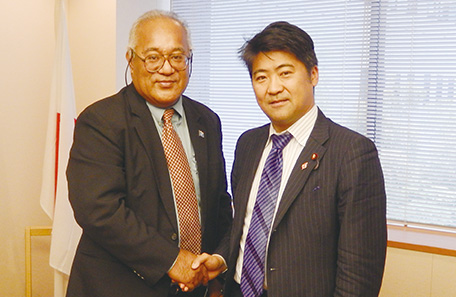
In October 2013, Parliamentary Vice-Minister for Foreign Affairs Seiji Kihara paid a courtesy call on Mr. Robert, Secretary of the Department of Foreign Affairs, Federated States of Micronesia, who was visiting Japan to attend the Pacific Islands Leaders Meeting (PALM).
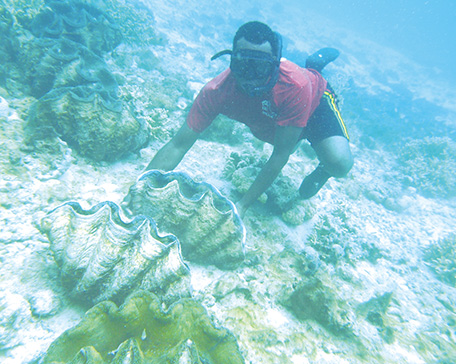
A project to cultivate giant clams, the largest bivalve in the world, in Vanuatu (Photo: Shigeaki Sone)
Furthermore, at the PALM Second Ministerial Interim Meeting held in October 2013, discussions were carried out regarding the follow-up of PALM6, preparation of the next summit, and issues shared by the Pacific island countries and their cooperation. The Pacific island countries/regions have challenges in the areas of the environment/climate change, education and health. In order to achieve sustainable development of these countries, Japan provides cooperation not only for each individual country, but also for regional cooperation that is beneficial to the entire Pacific region.
For example, in order to improve the capacity of disaster management of Pacific island countries and regions that are vulnerable to the impact of climate change and prone to natural disasters, Japan assists them in developing systems which allow people to evacuate properly. Furthermore, Japan works with the Secretariat of the South Pacific Regional Environment Programme (SPREP), a regional organization located in Samoa, to support the formulation of the Pacific Regional Solid Waste Management Strategy and human resource development in the area of waste management.
Note 6: PIF member countries/regions: Australia, New Zealand, Papua New Guinea, Fiji, Samoa, Solomon, Vanuatu, Tonga, Nauru, Kiribati, Tuvalu, Micronesia, Marshall, Palau, Cook, Niue
●Vanuatu
Port Vila Lapetasi International Multi-Purpose Wharf Development Project
Loan Aid (June 2012 - Ongoing)
Vanuatu is one of the island nations located in Oceania with a population of 250,000 living across more than 80 islands of various sizes. As an island nation, maritime traffic is crucial for the transportation of people and goods.
Port Vila, the international trading hub of Vanuatu, is experiencing a rapid increase of international cargo it must handle due to a rising volume of imports because of the country’s economic growth. However, the current cargo handling capacity of the international wharf has almost reached its limits. Furthermore, the current international wharf also serves as a passenger dock. With many more tourist cruises stopping at the port recently, interruptions were caused to vessel loading, and waiting at offshore began to happen regularly, which turned into a hindrance to logistics in Vanuatu.
In order to solve these problems, Japan has been assisting the development of a new international cargo-only wharf, the Lapetasi International Multi-Purpose Wharf. This project marks the first case of Japan’s assistance of Vanuatu through loan aid.
It is hoped that the new international cargo-only wharf will resolve the current situation of more demand than supply at the wharf, by increasing the loading efficiency and handling volumes of container goods and reducing waiting periods at the bay. It is expected that this will contribute to the development of Vanuatu’s economy ultimately.
(As of August 2013)
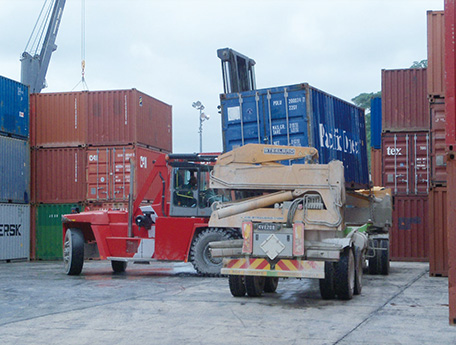
The current international wharf at Port Vila. The rapid increase of international cargo handled at the wharf has made even loading work difficult. (Photo: JICA Vanuatu Office)
●Solomon
The Project for Improvement of Non Revenue Water Reduction Capacity for Solomon Islands Water Authority (SIWA) / The Project for Improvement of Water Supply System in Honiara and Auki
Technical Cooperation Project, Grant Aid (2012 - Ongoing)
Located to the northeast of Australia, Solomon consists of approximately 1,000 small islands including Guadalcanal Island on which the country’s capital Honiara is located. Ethnic conflict between 1998 and 2003 and other factors caused delays in the building of basic infrastructure such as roads, electricity and water supply systems, while the level of public service also remains poor.
For instance, in terms of water supply, the rate of households connected to water service is only 72% (as of 2011). Due to the dilapidation of water pumps and pipes, water supply is unstable and approximately two-thirds of connected households only have access to water a few hours each day. Furthermore, water leakage due to poorly maintained water pipes, water theft, and malfunctioning water meters mean that the rate of non-revenue water is very high at 56% (as of 2011). These issues have become one of the reasons behind the deteriorating business performance of Solomon Water, which is responsible for the management of urban water and sewerage services.
In order to resolve these problems, a project was undertaken to improve dams and reservoirs and the water distribution and piping network in Honiara and Auki, one of the largest regional cities. The project was made possible through Japanese Grant Aid and was completed in August 2013. It is anticipated that the project will significantly increase the water supply rate in Honiara to 83%. Japan is also implementing a Technical Cooperation Project with Solomon Water, an integrated project designed to reduce non-revenue water. It is hoped that these projects will allow Solomon Water to reliably operate its water supply system and perform better as a business.
(As of August 2013)
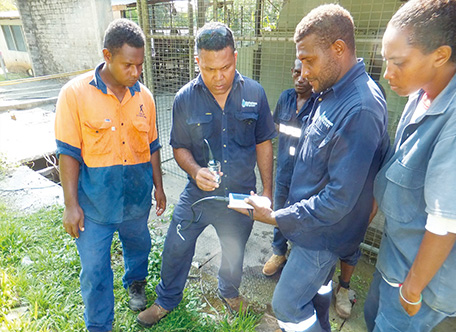
Hands-on training on the use of residual chlorine meter (provided by JICA). The meter is used to check if any water is leaking from the water pipe. (Photo: Embassy of Japan in Solomon)
